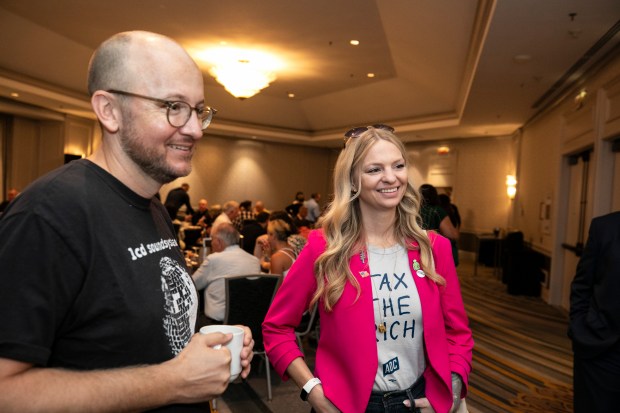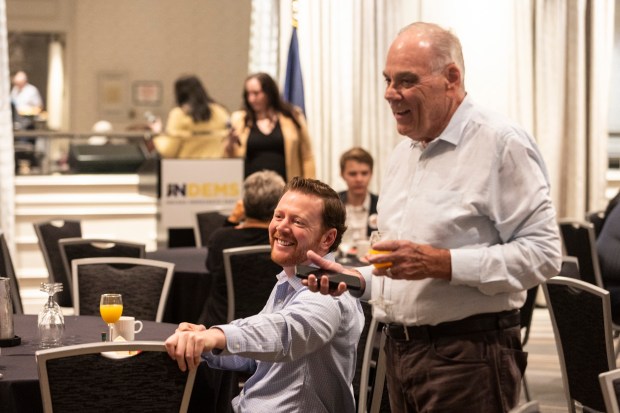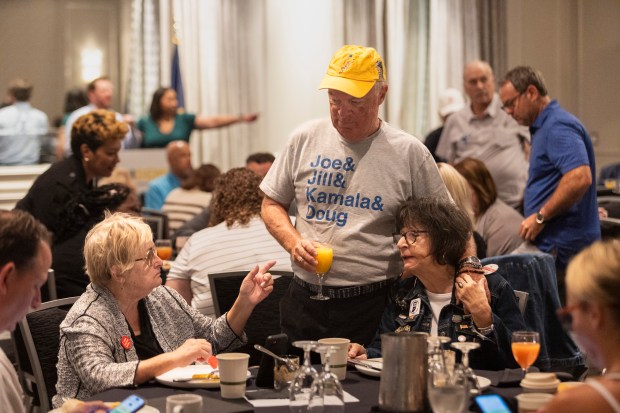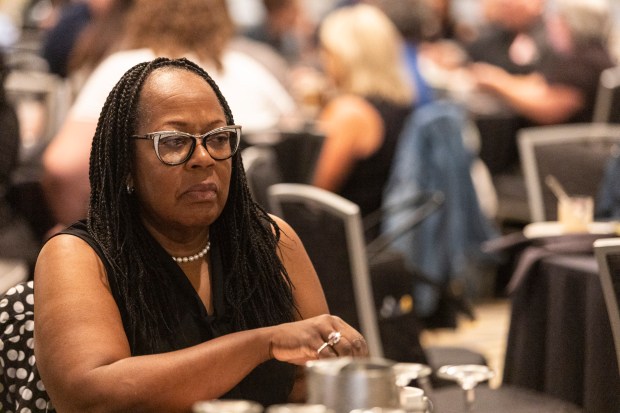Northwest Indiana Democrats, who are part of the state’s 88 Democratic delegates, shared their enthusiasm Monday for Vice President Kamala Harris and Minnesota Governor Tim Walz as the presumptive nominees ahead of the Democratic National Convention.
Running for president and vice president, respectively, the delegates hope for a Harris-Walz win in 2024 and Indiana Democratic candidates down ballot. Lake County Democratic Party Chairman Jim Wieser said Indiana has strong Democratic candidates for state and local offices.
“It’s helped. It’s a benefit. I certainly think in Lake County, Indiana, it’s a benefit given the diverse nature of our community,” Wieser said. “I think we’re going to do really well. It’s a definite help. Anytime you can generate this kind of enthusiasm, it’s going to help.”
As the 2024 Democratic National Convention kicks off in Chicago with planned protests amid the Israel-Hamas war, people will likely think back to the 1968 Democratic National Convention, which was also held in Chicago, said Raymond Haberski, professor of history and director of American studies at Indiana University-Purdue University Indianapolis.
But, Haberski said the atmosphere headed into the 2024 Democratic National Convention is different compared to 56 years ago. Throughout the upcoming week, Harris and Walz have an opportunity to solidify the excitement around their leading the Democratic ticket, he said.
“I think the atmosphere is not going to be as super-charged as it was in 1968. I don’t think you have the same sort of details that would be comparable today. There’s a lot of outright joy among Democrats about what the ticket looks like,” Haberski said. “My prediction is that the way that Harris and Walz have been building momentum it will be a crystallization of that.”

Region delegates
State Rep. Vernon Smith, D-Gary, said he supported President Joe Biden when he was seeking reelection. But, after Biden announced he won’t seek reelection in July and endorsed Harris, Smith said his excitement for the upcoming election grew.
“It’s going to be a very enthusiastic, unique DNC,” Smith said.
As a delegate, Smith said he will get to vote for the candidates presented for president and vice president. If any resolutions are proposed, the delegates will vote as well, he said.

Smith said he has been to six other Democratic National Conventions, and each one has been met with protests. The most violent convention was the 1968 Democratic National Convention in Chicago, Smith said, which he remembered watching on television.
“I am hoping that people understand that they have the right to protest. I just hope that it’s all peaceful,” Smith said.
Smith was a delegate for President Jimmy Carter’s election and reelection campaigns, he said. Smith said he was surprised that Carter lost his reelection to President Ronald Reagan in 1980 because that Democratic National Convention was energetic.

In 1996, Smith said he was a delegate when President Bill Clinton won reelection, which was also a lively convention.
“And of course you’ve got a lot of energy around this one,” Smith said.
State Rep. Carolyn Jackson, D-Hammond, said she looks forward to representing Indiana’s First District as a delegate. Harris has brought new energy to the Democratic ticket, Jackson said.
Jackson received a phone call from a constituent asking if it would be possible to leave checks in her mailbox to donate to Democratic candidates, she said, adding that she has never received a call like that.
“I think the energy is going. I know it is in Indiana,” Jackson said.
With Harris at the top of the Democratic ballot, Jackson said it will encourage voters to cast a ballot in November.
“I think it’s going to inspire people to come out and vote, and to understand that there is a momentum that we here in Indiana can change. We’ve had such low turnout for the last few elections, and I think it’s because people have kind of given up,” Jackson said.
Erin Collins, vice chair of the Duneland Democratic Committee and Chesterton councilwoman, said she’s excited for the Democratic National Convention with Harris at the top of the ticket.
Having Harris at the top of the ticket will help Indiana Democrats Jennifer McCormick, who is running for Governor, Valerie McCray, who is running for U.S. Senate, and Destiny Wells, who is running for attorney general, win their seats, Collins said.
“Kamala is making history. Everybody’s excited. You can feel the energy,” Collins said. “I think the top of the ticket, having Kamala there, helps all of our down-ballot tickets.”
Jim Harper, an attorney in Porter County, said the energy from the convention will help elect more Democrats in Indiana. Harper said he is most excited about listening to Harris’ convention speech.
“We have some good opportunities in the state. We’re all very excited about Kamala Harris and Tim Walz,” Harper said. “We’ve got a ticket that’s delivered results. We have a ticket that is focused on the future, is focused on building the middle class and moving the country forward.”
Wieser said the enthusiasm around the Democratic Party has shifted a lot in the last four weeks. Wieser, who has attended three other Democratic National Conventions, said the energy is comparable to 2008 when President Barack Obama was elected.
“It’s that feeling. It’s that momentum that builds and it becomes more than a campaign. It becomes like a movement,” Wieser said.
Wieser attended his first Democratic National Convention in 1984 in San Francisco, which was exciting because there was a contest for nominee. Walter Mondale, Vice President to Jimmy Carter who was ultimately nominated, faced Colorado U.S. Senator Gary Hart and Rev. Jesse Jackson, Wieser said, and he will never forget Jackson’s speech.
“Jesse Jackson gave the most incredible speech. He had that hall just rocking,” Wieser said. “It’s kind of like that energy only we already know where we’re going afterwards.”
Wieser said he’s most looking forward to listening to speeches from former Democratic presidents Bill Clinton and Obama.
“I worked at both of their campaigns and went to both of their inaugurations,” Wieser said. “I think that’s where we can be with Kamala Harris. I think that we could be at that level.”
Echoes of 1968
Ahead of the 1968 Democratic National Convention, there were three major historical events — including two assassinations — that led to protests and riots throughout the country, Haberski said.
President Lyndon B. Johnson, a Democrat, announced March 31, 1968 he wouldn’t seek reelection. Johnson resigned largely because of criticism over his handling of the Vietnam War and political challenges from members of his own party — namely Eugene McCarthy and Robert F. Kennedy.
On April 4, 1968, Martin Luther King Jr. was assassinated while on a balcony outside his motel room in Memphis Tennessee, then Kennedy, who many believed would have become the Democratic nominee, was killed on June 5, 1968 after winning the California primary.
While the Israel-Hamas war continues and will lead to pro-Palestinian protests at the Democratic National Convention, Haberski said the war isn’t a top issue for voters the way the Vietnam War was in 1968.
Another major difference between the two wars, Haberski said, is that while Johnson resigned because of his leadership amid the Vietnam War, Biden did not step aside because of his leadership amid the Israel-Hamas War.
“I think the war in Gaza, as horrific as it is, is not the top issue on Americans’ minds. It may be for certain sectors of a certain part of the younger generation. But the Vietnam War absolutely dominated the way Americans saw themselves and their country by 1968,” Haberski said.
The movement against Vietnam, and by extension Johnson, enabled President Richard Nixon to win the 1968 election, Haberski said. Nixon continued America’s role in the Vietnam War, though he decreased the number of troops, and ended up resigning from office in 1974 amid the Watergate scandal.
In 1971, portions of the Pentagon Papers were leaked to the media and began exposing how much the U.S. Government lied to its citizens about its role in the Vietnam War, Haberski said.
With that history in mind, Haberski said it is possible for Harris and Walz to address the Israel-Hamas war as a serious issue and present ways of moving forward.
“I don’t think it’s going to be a convention that directly has to respond to the protests about the war in Gaza as the defining item. There are many other things in competition for that,” Haberski said.
Demonstrations during the 1968 Democratic National Convention led to violent clashes between protestors and Chicago police officers, Haberski said, with national broadcasts showing police beating protestors as others chanted “The Whole World is Watching.”
Then-Chicago Mayor Richard J. Daley had a strong law and order ideal, Haberski said, so he encouraged a large police presence amid protests. The attitude around deploying police officers against protesters has shifted significantly since the 1968 convention, Haberski said.
“I think there are plenty of protestors who would like to imagine that what they’re about to do resembles 1968. I think we need to understand that what happened in 1968 was both heroic and awful, and no one who was involved in it thought that they got a lot out of it. It didn’t end the war. Richard Nixon was elected. So much more organizing had to happen after that,” Haberski said.
The Democratic National Convention returned to Chicago in 1996, Haberski said, and it went well for Democrats with the election of President Bill Clinton.
“It was a real celebration for that moment,” Haberski said.



